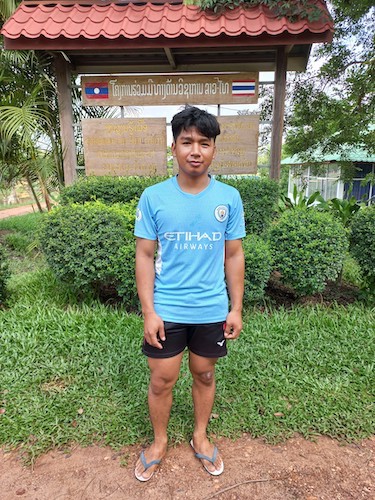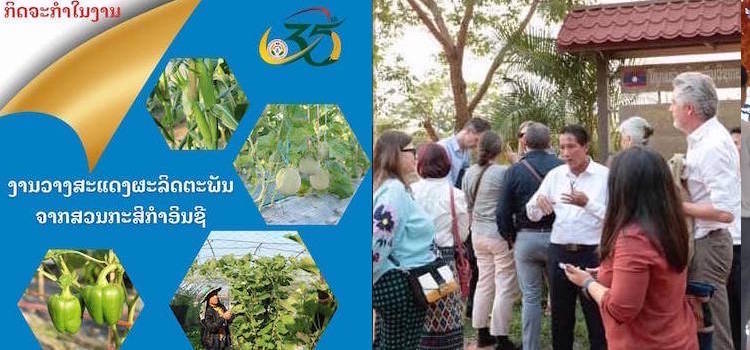By Pattama Vilailert
VIENTIANE, Laos. 28 June 2023 (IDN) — It was at the height of the Thai Economic Crisis in 1997 that the term “sufficiency economics” came into prominence when the late King of Thailand Bhumibol Adulyadej told his people that rather than building factories to become another Asian Tiger, the important thing for Thais is to have a sufficiency economy.
“A sufficiency economy means to have enough to support ourselves,” he said[1]. Since then, this theory of economic development has been adopted in over 23,000 Thai villages. It is now making its mark in neighbouring Laos.
Just about 13 km from the busy “Morning Market” in Vientiane stands the Learning Center for the Development of Sustainable Agriculture Based on Sufficiency Economy Philosophy (SEP) at The Dongkhamxang Agriculture Technical College.
The Learning Center features learning stations that allow students to learn how to organically grow agricultural products, culture fish, and carry out animal husbandry.
“Vientiane is quite modern, fewer people work in the farm and agriculture area has also declined,” Vitida Sivakua, a Thailand International Cooperation Agency (TICA) Officer told IDN.
Vitida’s remark is in line with a survey in 2021, conducted by the Lao National Statistics Bureau of the Ministry of Planning and Investment, which mentioned that the number of Lao farmers had sharply declined in the last ten years. “The percentage dropped from 77 percent of the total population [of 7 million] in 2010 down to 69 percent in 2020 because many Laotians gave up farming to become laborers in the cities.”
To sustain the momentum of Lao agriculture and produce agricultural students to prolong the farming society, Chittakone Sisanonh, Director of Dongkhamxang Agriculture Technical College determined to set up the Learning Center.
He told IDN that the idea of establishing the center came into his mind when he studied in Thailand from 2003-2006 and visited a few SEP Learning Centers where he visualized that it is possible to have such a center in Laos because the natural resources of the two countries are similar.
The idea came to fruition when TICA visited the college in 2007. “Our teaching approach is in line with the SEP concept, so I approached TICA to provide a learning center so that our teachers, students, and people nearby could learn how to do agriculture using the SEP approach.”
“The sufficiency economy philosophy (SEP) emerged to encounter (the Thai) financial crisis in the early 1990s, and the Thai government applied the sufficiency economy philosophy to revitalize the economy and subsequently, it has been included in Thailand’s National Economic and Social Development Plans ever since,” explained Vitida.
“Thailand used to be a recipient country, we had learned a lot while receiving development aids and knowhow from other countries and adapted it to the Thai context, gradually since 1963, we turned to a giving country, (what)we are good at developing (we were) able to pass it on to neighboring countries,” she told IDN with her vivid eyes.
“The SEP core working theme is ‘Understand, Approach and Develop’. So, before we translate the SEP approach into projects, we hold meetings with prospective countries to understand what kind of assistance they need, once we found that, we talked with related agencies in Thailand to accommodate and develop the projects with us,” said Vitida.
Sufficiency Economics has three components: moderation, reasonableness, and self-immunity, with two accompanying conditions: appropriate knowledge and ethics and virtues. Moderation is applied with reason, in the sense of not too much or not too little, which is an Eastern concept based on the Buddhist middle path. Reasonableness requires that the choices we make be justifiable by using academic approaches, legal principles, moral values, or social norms. And Self-immunity emphasizes the need for built-in resilience against the risks, which arise from internal and external changes by having good risk management[2].

< Anuson Sayavong. Photo Credit: Pattama Vilailert
“I think, I understand what SEP is all about,” Anuson Sayavong told IDN while looking after the cows in the center. “My family wanted me to study here rather than helping them on the farm like others and it’s worth it because I learn about production planning and making the soil fertile. It is very necessary as climate change makes natural production unpredictable.”
“At the Learning Center, the bridge is built to link two agricultural areas: one is for animal husbandry practice and the other is for vegetation,” explained Anuson. “I am responsible for animal husbandry so I come here every morning to look after cows and if they are sick, I will give them some injections and my classmates work on the farm on the other side to take care of the vegetation.”
Chittakone further explained Anuson’s point: “Actually, we have 22 learning stations in our center, since the beginning, each station had been designed to match local agriculture like cricket and frog culture stations and over time some of the stations have been modified into the marketable products.”
“We have also learned that SEP is not only about producing agriculture to make ends meet in the family but also about finding ways to live sustainably; therefore, we are gearing towards making our products saleable to a wider market,” Chittakone added.
“The organic Melon is our top product, and we cannot meet market demand,” Anuson added. “We can sell melons easily because people around here know that our products are chemical free and we publicize them on our webpage, once the melons are sold, our teacher would save the money to spend on the center expenses and this is how I understand SEP,” he said.
The Vision 2030 and Ten-year Socio-Economic Development Strategy (2016-2025) of Lao P.D.R states that the vision of the agriculture sector for the year 2030 aims at “ensuring food security, producing comparative and competitive potential agricultural commodities, developing clean, safe and sustainable agriculture and shift gradually to the modernization of a resilient and productive agriculture economy, linking with rural development contributing to the national economic basis”.
In line with this vision, the Lao government offers 200,000 Kip (11 USD) a month to those studying agriculture, carpenters, metalwork, and buildings, but only a few teenagers want to study in these fields.
Hommala Phensisanavong, an academic at Lao National University shares her concern about the declining number of university students: “Since 2019, the number of Lao students decreased by 38% from elementary school to university levels, COVID-19 is one of the reasons and another is parents do not have enough money to support their children,” she said.
Chittakone agreed with that “Currently, the cost of living in Laos is very high because of the inflation, even though World Bank and Asian Development Bank grant some loans through our governments, not many people qualify to get the loan so I have tried to make the Learning Center sustainable so that it can generate some income to teachers and students in the long run”.
“Annually, we have several visitors from various development organizations, right now we are working with Japan International Cooperation Agency (JICA) on marketing training for our teachers, after the training, we hope to market our product online and we also approached the World Bank for the funding of our stall in front of the center and 2025 we will open the center to tourists, by doing all these, our center and our life will sustain,” said Chittakone.
Dongkhamxang Agriculture College is not the only institute in Laos that conducts SEP. There are four more learning centers scattered in the country: Attapeu, Bokeo, Khammouane, and Xayaboury.
“Laos is not different from Thailand in terms of language and culture allowing the SEP approach to bear fruitful results,” Vitida said and further mentioned that besides Laos, Timor also applied SEP in agriculture. “Thai farmers taught Timorese farming leaders about how to use SEP in their farms, and now they can train the farmers by themselves, this is TICA’s mission to materialize development concept through cooperation.” [IDN-InDepthNews]
Photo: Collage with pictures of products of SEP (left) and EU visitors with Chittakone Sisanonh, Director of Dongkhamxang Agriculture Technical College (right). Credit: Dongkhamxang Agriculture Technical College.
IDN is the flagship agency of the Non-profit International Press Syndicate.
This article was produced as a part of the joint media project between The Non-profit International Press Syndicate Group and Soka Gakkai International in Consultative Status with ECOSOC on 28 June 2023.
We believe in the free flow of information. Republish our articles for free, online or in print, under Creative Commons Attribution 4.0 International, except for articles that are republished with permission.
[1] Thailand Human Development Report 2007; Sufficiency Economy and Human Development(PDF). Bangkok: United Nations Development Program (UNDP). 2007
[2] Philosophy of Sufficiency Economy – https://thaiembassy.se/en/monarchy/philosophy-of-sufficiency-economy/

